Every so often, I get an odd run of books sharing a particular plot element or type of character, despite having been selected for reasons unrelated to that element or character. There was, for example, a week in which every novel I read featured a protagonist who lost a hand as a side effect of violent dynastic disputes.
More recently, I encountered four books1 in one week that featured active, interventionist gods. It was a remarkable coincidence, particularly as the four books are otherwise quite dissimilar. Identifying the books is something of a spoiler, so here, have a free spoiler alert before reading further!
The Crystal Cave by Mary Stewart (1970)
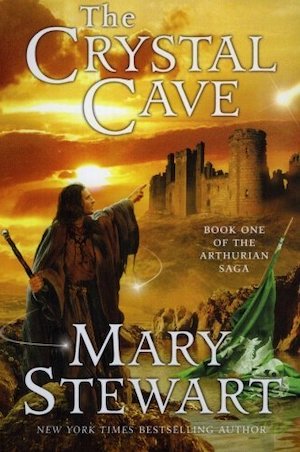
The Crystal Cave is the first of five volumes retelling the well-known Arthurian saga. Stewart’s twist in the first three books2 was to select as her viewpoint character Merlin. Merlin’s version of events begins when he was a boy, a bastard born to a Welsh princess in strife-torn post-Roman Britain.
Many versions of Merlin are fire-ball casting sorcerers, who sometimes verge on the demonic. Stewart’s Merlin is a bright young man of purely mundane origins. While he does learn a bit of actual magic, it is minor stuff. Merlin relies more on the appearance of magic rather than the reality, playing off other people’s superstitions for his own ends.
However! Merlin does from time to time have authentically prophetic visions. These seems to be some divine entity working through Merlin to shape British history. The identity of the entity is not clear, at least to me, nor is its motive evident. Gods, even those that tamper in daily life, can be very enigmatic.
Midnight at the Well of Souls by Jack Chalker (1977)
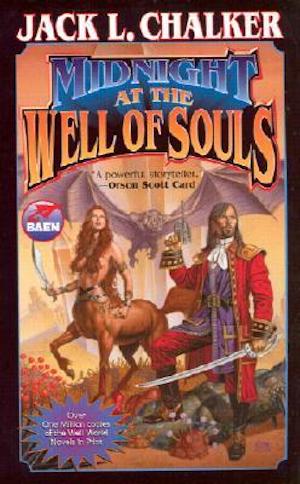
Published only a few years after The Crystal Cave, Midnight at the Well of Souls could not be more different from the Stewart novel if it tried. Midnight is a futuristic science fiction novel in which two groups of humans (one composed of a would-be murderer and his unwilling victim to be, and the other of the passengers and crew of a star freighter) are teleported across the light years to the artificial planet known as the Well World.
Transformed by the Well World into new, alien forms, the castaways become caught up in a quest to save the universe. The Well World can be used to alter the very laws of physics, a tactic very tempting to a homicidal fanatic determined to overthrow oppressive, conformist human governments. Whether anything would survive his tampering is unclear; therefore, he must be stopped, if he can be stopped. As is common in almost all megastructure novels, this turns out to involve a tremendous amount of walking from one place to another.
The Markovian aliens who built the Well World were mortals who gained godlike powers.3 Somewhat to the surprise of the characters in Chalker’s novel, one of their number gained godlike power by actually being a god. Having a god onside for a team effort is tremendously useful, provided one does not (as a number of the antagonists do) piss the god off enough to attract a smiting.
The Thousand Eyes by A. K. Larkwood (2022)
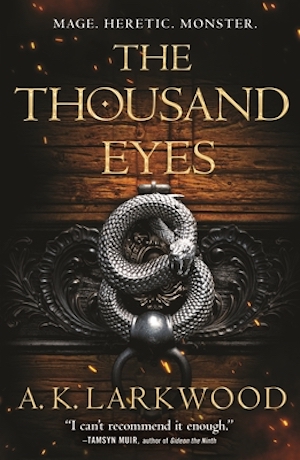
In this second and final volume in the Serpent Gates duology, murder-hoboes-for-hire Csorwe, Qanwa Shuthmili, and Talasseres Charossa provide an archaeologist with sufficient protection to reach and explore relics of the long-vanished Echentyri empire. It is not enough protection to save the archaeologist, who is killed by Cherenthisse, a fanatical acolyte of the empire (she had been preserved in stasis for thousands of years; the group revived her).
It would be logical to kill the acolyte, but no…she could tell us so much about the past! Our heroes spare Cherenthisse and bring her back to civilization. Bad move.
Cherenthisse occupies herself with a couple of hobbies. First: trying to find some way to resurrect Cherenthisse’s dead snake goddess. Second: rebuilding the empire, bringing about a new golden age of horrific oppression. This would be bad. It is up to the adventurous trio to stop Cherenthisse.
They comprehensively fail: good news for the reader, who is provided with thrilling tales of the Resistance, but very bad news for the protagonists and many bystanders.
Larkwood’s sword-and-sorcery setting features an abundance of gods. Most of the gods appear to be determined to demonstrate why having an abundance of actively interventionist gods is a bad thing. Were this not bad enough, the plot is driven by the fact that gods are very hard to kill. Even dead gods can get do-overs, provided there is suitable mortal container into which the god can be decanted. “Possessed by a dead god” seems to be about as common a malady in Larkwood’s setting as measles is in ours.
Jackal by Erin E. Adams (2022)
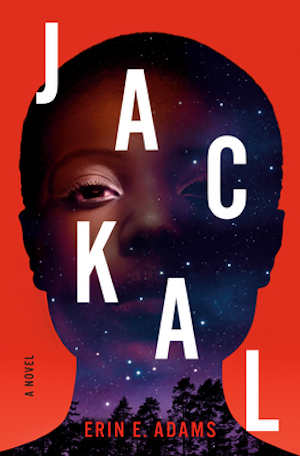
Haitian American Liz Rocher very reluctantly returns to Johnstown, PA to attend her best friend Mel’s wedding. The marriage crosses race lines; Johnston being the sort of community that it is, Liz expects the celebration to be strained at best and filled with thinly veiled racist comments. She does not expect Mel’s daughter Caroline to vanish while under Liz’s insufficiently watchful eye.
Liz’s faith in the Johnstown police (at least where Black or mixed-race victims are concerned) is limited. Years ago, the police failed to solve Keisha Woodson’s kidnapping and murder. Liz discovers the situation is even worse than she knew. Caroline and Keisha are just two of a long string of vanished Black girls; many of the disappearances have been followed by the discovery of the victim’s gutted corpse. Can Liz find Caroline in time to save her? Can she avoid being framed by a killer who seems to have an inside line on Liz’s efforts?
I’d seen Jackal billed as horror, so it was not surprising that there is a supernatural element. An actual living god was still something of a surprise. Also noteworthy is the manner in which the god is discussed; the author makes it clear that the god is not to blame for the killings. While the serial killings provide it with an opportunity and it certainly encourages them, it’s only taking advantage of an existing situation. No convenient “the devil made me do it” handwashing here.
***
Aside from including a living god in the dramatis personae, the four novels above didn’t share much else. One is a historical fantasy, one is futurist SF, one is a secondary world fantasy, and one is a modern-day supernatural murder mystery.4 It is a lesson in how a seemingly straightforward concept can be implemented in a diversity of ways, across any number of genres.
No doubt other examples may come to mind, books I did not mention for obvious reasons.5 If you’d like to mention them, comments are, as ever, below.
In the words of fanfiction author Musty181, four-time Hugo finalist, prolific book reviewer, and perennial Darwin Award nominee James Davis Nicoll “looks like a default mii with glasses.” His work has appeared in Interzone, Publishers Weekly and Romantic Times as well as on his own websites, James Nicoll Reviews (where he is assisted by editor Karen Lofstrom and web person Adrienne L. Travis) and the 2021 and 2022 Aurora Award finalist Young People Read Old SFF (where he is assisted by web person Adrienne L. Travis). His Patreon can be found here.
[1]I know, five books would have fit my usual pattern better. Doesn’t actually fit the facts, so four it is. It would have been five in a row if I’d read the next tankobon of “Delicious in Dungeon” but I decided to read “Insomniacs After Class” instead. Oh, well. “Insomniacs” is fun but it doesn’t fit the themes of this essay.
[2]I have not read the last two Merlin novels by Stewart, “The Wicked Day” (1983), or “The Prince and the Pilgrim” (1995).
[3]The Markovians remind me of the long-vanished Krell, who are essential to the backstory of the movie “Forbidden Planet.” Unlike the Krell, the Markovians were canny enough to foresee possible failure modes of their invention, which is why they enjoyed a long existence before deciding to go voluntarily extinct, The Krell died en masse as soon as they hit the “on” button.
[4]“Jackal” very nearly belongs to another set of thematically related mysteries I used to frequently encounter, among whose common elements were a woman protagonist, recently widowed or divorced, who leaves the big city behind for small-town life involving (usually) a new beau, an adopted or fostered child, a career in some appropriate small-town occupation, and a sideline in solving murders. “Jackal” ticks most of the boxes. The most obvious manner in which it does not is that Liz is going to exit Johnstown as soon as the opportunity presents itself. It’s only as I type this that I see the other thing those mysteries had in common: the protagonists were all White.
[5]Because aside from featuring living gods, the one thing these four books had in common is that I read them in the third week of February 2023.










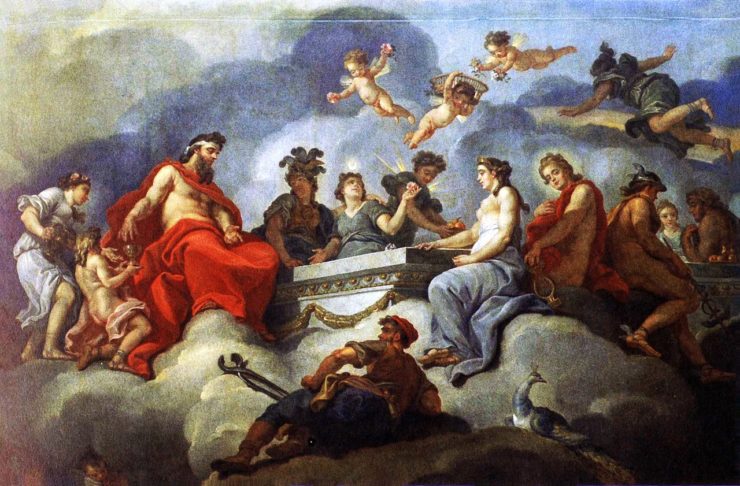
Neil Gaiman’s American Gods has highly interventionist gods in contemporary USA and Kingsley Amis’ ghost story The Green Man features a cameo appearance from the Almighty himself.
Jo Walton’s amazing Thessaly Trilogy comes to mind here.
The Thieves World Series is chock full of various gods, demigods, and assorted other priests and vessels for/vassals of divine power. All meddling and generally making a bad situation much much worse
Re: footnote #4: Out of curiosity…would you be willing to name the mysteries which included the listed elements? I’m not going to ask for a list of the books with the one-handed protagonist!
Turner’s Thieves World series does double duty with a protagonist who loses a hand
Zelazny’s Lord of Light seems a fit!
ecbatan:
Except that the ‘gods’ in Lord of Light were explicitly humans, cosplaying as gods due to having access to advanced technology.
Everything set in Bujold’s world of the Five Gods.
7) Of course! But I think that makes it a good comment on the whole subject.
Hey, another reason to mention the Queen’s Thief series! Everyone should read it!
Seconding the World of the Five Gods.
The gods in the Dresden Files series have varying degrees of influence in the real world, largely dependent on how many people still believe in them. Odin seems to just be a very (extremely) badass wizard, for instance. None of the Hindu gods have shown up yet, but that could be interesting.
The gods in the He Who Fights With Monsters series are all based around concepts (Knowledge, Deceit, Healer, Dominion, etc) but only exist in worlds with enough magic (so not Earth).
> Jo Walton’s amazing Thessaly trilogy comes to mind here.
And because you mentioned that I’m remembering Thessaly from the Sandman saga by Neil Gaiman. Running into gods was a recurring part of her life, much the way people run into authors at SF conventions.
Scott @11 — People usually enjoy encountering authors at SF conventions (though the enjoyment is sometimes not mutual). Thessaly’s interactions with gods are usually negative, as I recall.
@@@@@7. JReynolds197
The same is true with the Markovians: they were (are?) in possession of truly god-level technology.
Off the top of my head, I can think of three series of books with very nosy, extremely hands-on deities –who turn out to be Clarke’s Third Law transhuman entities:
a) Richard K. Morgan’s A Land Fit for Heroes trilogy
b) Jim Grimsley’s Irion books –three so far
c) Steven Brust’s Vlad Taltos series
Dave Duncan used this in some of his fantasy worlds (not all of them).
In The Seventh Sword books the ruling Goddess of the world is mostly hands-off, but she does send an assistant god to get the plot moving.
The gods show up at the start of both Pandemia tetralogies in a somewhat similar fashion, not to mention at the end of the second one in a much more significant way.
In the first Omar book (The Reaver Road) at least one god takes an active role via a temporary human avatar, and most of the second one (The Hunters’ Haunt) takes place in a land full of small household and municipal gods who are pretty active. And of course it seems likely that Omar is actually a god himself.
13: However, one of the characters in Well World is God, the person on whose shoulders all reality rests.
He’s lonely, incredibly depressed and borderline suicidal.
How about The Godmakers by Herbert?
One character becomes a “god” or as they also call him a “psi-focus” with seeming intervention all along the way.
Oh, thought of a classic! Jerome Bixby’s 1953 It’s a Good Life, in which a young boy provides a small town with all the divine intervention they could want and more.
#17: Or for that matter God-Emperor of Dune, in which Leto II is, for all political purposes, God.
If we’re talking classics, Melichrone in Sheckley’s Dimension of Miracles (1968) is not as psychopathic as Chalker’s example but is definitely lonely — and egotistical enough to have created a meteorological self-introduction.
IIRC, we’ve agreed to disagree about whether Theseus in Mary Stewart’s Athenian duology is actually hearing from a god or is just telling himself the god is urging what Theseus himself wants to do.
Continuing @15: at the climax of the tetralogy A Man of His Word, we discover that while one person can hold up to four words of power, all it takes to become a god is two people and five words — which leaves us wondering why there aren’t more gods, given how conveniently one is created.
Does Good Omens count?
I recently enjoyed Hanrahan’s Black Iron Legacy trilogy. Gods are active, powerful, and defined by their peoples. Effects of colonization and war reshape them into instruments of violence keeping a nasty cycle going. Hanrahan does some neat things with moving magic and prayer to industrial scale.
A minor detail, but one I wouldn’t expect to find elsewhere — one of our protagonists meets a group of restless dead spirits. They need proper coinage to travel to their afterlife. Centuries ago, when those ghosts were alive, their land was ruled by a conquering power who insisted their currency be used. They’ve since left, but their money is still needed for the ritual.
@20 The missing element in your spoiler protected formula is love. That may explain why there are comparatively few, although I seem to recall there are hundreds of gods, if not thousands.
Jim Butcher’s Dresden files has had at least one actual god appear – Hades. Although he only barely qualifies as active. If archangels count, Uriel aka Mr. Sunshine is certainly active, albeit very limited in the scope of what he can do directly. Not unlike Gandalf, really.
The Belgariad and the Mallorean probably count, although the gods mostly work through pawns except at climactic moments.
Phillip K. Dick’s The Divine Invasion couldn’t be more on-topic if it tried. The character Emmanuel is literally God incarnated.
If you’re in search of a major time-sink, try TVTropes DeityOfHumanOrigin for more examples.
Re Footnote 2: I haven’t read The Prince and the Pilgrim either, but The Wicked Day is Mordred’s story told from his point of view. The title refers to the Battle of Camlann and the death of Arthur. I haven’t read it in decades, so I don’t remember if he has any interactions with gods, though he does bump unhappily against Merlin’s prophecies and possibly his mother’s own magic.
Not quite interacting with a god, but Mike Resnick’s The Branch is about someone who is literally the Jewish Messiah as described in the Torah and Rabbinic literature. He is also a very naughty boy.
Robert Jackson Bennett’s Divine Cities Trilogy is an excellent addition to this list. I dare not say much as it is best approached knowing very little but it is a wonderful read especially for anyone who enjoys the works mentioned in the comments section and the original post here.
@27 – Agreed, Bennett’s Divine Cities trilogy is excellent.
There’s Brenda Clough’s How Like a God, in which the protagonist acquires god-like powers, apparently from nowhere, although AIR Gilgamesh was involved somehow.
@21, @24: I haven’t read all of Jim Butcher’s Harry Dresden stories but… good and evil angels show up, yes. A difference in Terry Pratchett’s “Good Omens”, a spoiler perhaps, is that the angels of Heaven are not carrying out orders from God, they are holding an Apocalypse whether God wants it or not. By the end of the story, God may have acted ineffably (I don’t think they manage in story to explain what that means, which… is what it means) so things came out as He wanted. And we’ve seen a schoolboy become a genius loci. Jim Butcher’s non-fallen angels are explicitly doing God’s will, although part of God’s will here is to allow freedom of human free will, and perhaps of other creatures. Fallen angels are allowed to exist because… I think maybe it’s ineffable. And for us, because some thrilling but alarming stories in the series won’t exist without them.
And Harry Dresden’s fairy principals are up there for powers with Ben Aaronovitch’s “Rivers of London” – from Father Thames to Beverly Brook – and those, at least as they frequently claim, are gods. “We used to get heads,” one remembers nostalgically about the days when humans didn’t just talk about making sacrifices… on the other hand, cellphones are practically useful. Heads… probably aren’t…?
@21 – Yes God in Good Omens counts, but their goals are ineffable.
Also, Gene Wolfe’s Soldier trilogy has active gods, but only the brain-damaged protagonist can see and hear them.
The Narnia series?
‘ “Possessed by a dead god” seems to be about as common a malady in Larkwood’s setting as measles is in ours.’ Would that be measles before the vaccine was available or after, or as common as it is currently due to the prevalence of vaccine-deniers?
I think that Guy Gavriel Kay’s Fionavar Tapestry trilogy fits the theme. Let’s see, there’s Mornir (similar to Odin), Ceinwen (similar to Artemis) and more.
RE: Saavik:
1. A divorced woman who moves herself and her teen-aged son from New York City to Eastport, Maine is the Home Repair is Homicide series by Sarah Graves (16 books). The same characters appear in a sequel series, Death by Chocolate, that has six books so far.
2. Joan Hess has one 16-book series about a woman who gets divorced and moves from NYC back to the village where she was born and reared. Arly Hanks becomes the chief of police for Maggody.
3. If you don’t mind the fact that she didn’t move, Joan Hess’s other series, 20 books strong, is about a widow named Claire Malloy who runs an independent bookstore. Her teen-aged daughter, Caron, has mastered the art of speaking in Capitals.
4. Widowed Sarah Kellings stays in Boston. She comes with a boatload of eccentric relatives, some of whom will later help her solve mysteries. One, a much older widow, solves a mystery in one of the books. The author is Charlotte MacLeod.
5. If you like historical mysteries and don’t mind NYC, the gaslight mysteries are about a doctor’s widow who is a midwife. Her name is Sarah Brandt and the author is Victoria Thompson.
6. Out of print and a product of the times it was written, the Grace Latham – Colonel Primrose series by Leslie Ford features a widow with two sons who solves mysteries with help from her unwanted suitor, the Colonel. The first book, The Strangled Witness, is in third person and about Primrose only. The rest of the books are from Grace’s first person viewpoint.
I recommend this site for finding cozy mystery series: https://cozy-mystery.com/
@33 Ann Nichols: Thanks for the list! I was actually particularly interested in the element of the detective’s foster or adopted child. I read one series in the 1980’s which included that (and for the life of me, I can’t think of the author or detective’s name, and the books are buried in a box in the basement), but I was curious to hear that that was a common element in a bunch of mysteries with newly single female detectives.
Pierce Anthony’s Incantations of Immortality is a several book series with each book based on a different god.
@35 – Piers Anthony’s Incarnations of Immortality
N.K. Jemisin’s Inheritance Trilogy is chock-full of the antics of gods, including a mortal who basically ascends to godhood.
Tamsyn Muir’s Locked Tomb series has a living god aka “God”.
Video game, so not a literary text per se, but who can forget Morrowind’s Three Living Gods, the Tribunal?
Lawrence Watt-Evans Touched by the Gods seems to fit, although, again, the gods work through mortal agents here.
Fafhrd and the Gray Mouser run afoul of gods on several occasions. In “The Shadow of the Executioner” they’re targeted by the God of Death himself. Later they invoke the ire of their patron deities.
Thessaly’s interactions with gods are usually negative, as I recall.
Several gods’ interactions with Thessaly were profoundly negative as well.
Most mortal encounters with Thoth involve a lot less stabbing…
I’m a little surprised that nobody has mentioned Ursula Vernon’s Digger, which involves several gods and one statue of a god, all of which are too active for the protagonist’s taste.
“What good is a god that doesn’t fossilize?”
The title character of Changer is an athanor, a magical race with unlimited lifespan (although, IIRC, they *can* be killed, it’s just not as easy as it is for humans) which includes many gods. Changer himself is known to different mortal cultures as Proteus and Coyote, and gods as varied as Anansi, Athena, Loki, Dionysus, Poseidon, Ogun, and Susano-o also appear, along with some not exactly divine but larger-than-life figures like Gilgamesh, King Arthur, Merlin, and Circe.
Small Gods by Terry Pratchett.
chip137@20: I think you mean Mary Renault?
For younger readers, The Gods in Winter by Patricia Miles. For all readers, The Cabala by Thornton Wilder. Both deal with the premises of how the Greek gods live in modern times, being immortal.
Kage Baker’s Anvil of the World series has a goddess who has retired to married life with a demon.
One of the books in her Company series has Joseph acting as Sky Coyote to recruit a group of Chumash.
@39- I believe Fafhrd himself became a god once- starting as an acolyte of Issek of the Jug. (not to be confused with Jugged Issek)
David Drake’s Northworld Trilogy. The stories include some clever bits on using powers – that is working mysteriously – to evade self imposed rules.
@@.-@ @33 @34: Are we talking about detective stories where there is a spare child at the end of a book for the female detective to adopt, counting as character development?
Ben Aaronovitch’s Peter Grant hasn’t done it – when one came his way, he briefly considered recruiting Molly the vampire housekeeper to look after them – but he has got a dog that lost its owner in the first “Rivers of London” book, and by “lost” I mean “they died messily”. But now I think of it, the dog spends more time with Molly too. Cupboard love.
Max Gladstone’s Craft sequence, and El-Mohtar and Gladstone’s This is How You Lose the Time War are recent books with active god characters. Heinlein’s Job a Comedy of Justice is a book from the 1980s featuring meddling god(s). I feel like there are many more but not coming to mind just now besides the Aaronovitch/Gaiman/Jemisin/Pratchett already mentioned.
The Nightlife Of The Gods by Thornton Wilder. A mortal discovers how to bring statues to life. Venus de Milo’s garments keep falling off.
50: I believe the author’s name is Thorne Smith.
Jack Chalker’s “And the Devil will drag you under” is somewhat on the same line, although a demon named Asmodeus Mogart is involved. But he tries to gain godlike powers with the help of mortals he sends to various worlds to collect magical stones. It’s a ruse as he created the situation requiring the humans to follows his obviously shady intentions, yet with these two, a man and a Woman, Mogart bit off more than he can chew.
Not high literature, but I found it quite pleasurable and sometimes whitty.
@49 – Heinlein’s Job refers both to the Biblical Book of Job as well as to James Branch Cabell’s Jurgen: A Comedy of Justice, a satiric fantasy notorious after its 1919 publication for being the subject of an obscenity suit brought by the New York Society for the Suppression of Vice (an organization founded by the same Anthony Comstock responsible for the Comstock Laws that were instituted on the national level).
@50, @51 — I will say that a version of Our Town written in the style of Thorne Smith might be interesting!
I’m surprised to come here so late and find no mention of Steven Eriksen’s “The Malazan Book of the Fallen” series. Chock full of gods!
Besides Small Gods by Terry Pratchett, as already mentioned, Nation, a non-Discworld novel.
Midnight at the Wells of Souls. Call the ‘conformist’ governments what they were in the book; communist world governments that took away all rights and choices of their people, as well as their right to live and even have genitals, while lying to them about fairness and equality. Meanwhile the dictators ruling those commie worlds were rich, did what they wanted, and were drug addicts while spreading communism to other worlds. The MC even lamented about their expansion in the universe.
And the Kate Daniels series by Ilona Anderson. Kate has a god for a father and an aunt. The books maintain that crowd sourcing gives a god the power to manifest once enough people believe in them while Kate is always trying to discourage people from believing in her as a god.
For me a great example of a series when gods feature heavily in the narrative is Steven Erikson’s Malazan Book of the Fallen. Large pantheon with each god selecting mortals to become players and pawns in each respective gods plans. All of this is a backdrop to a fantastic sword and sorcery story about an expansionist military empire with a rich and exciting backstory.
I saw the Belgariad and the Mallorean mentioned but not “The Redemption of Althalus” from the Eddings should be on the list. Basically a book about a thief and a god.
Stormlight and Cosmere spoilers, maybe?
Are not the major diety-like shards basically gods? And are like a literal active force in the world? Did I misread the entire article or are we sleeping on the biggest missing entry here?
The Sundering Duology by Jacqueline Carey
https://www.jacquelinecarey.com/portfolio-items/banewreaker-volume-one-of-the-sundering/
A Certain Carpenter involves himself with the affairs of mortals (for their own good, and boy do they need it) in RAISE THE GIPPER! by John Barnes. Events have outrun it bigly, but it’s still hilarious.